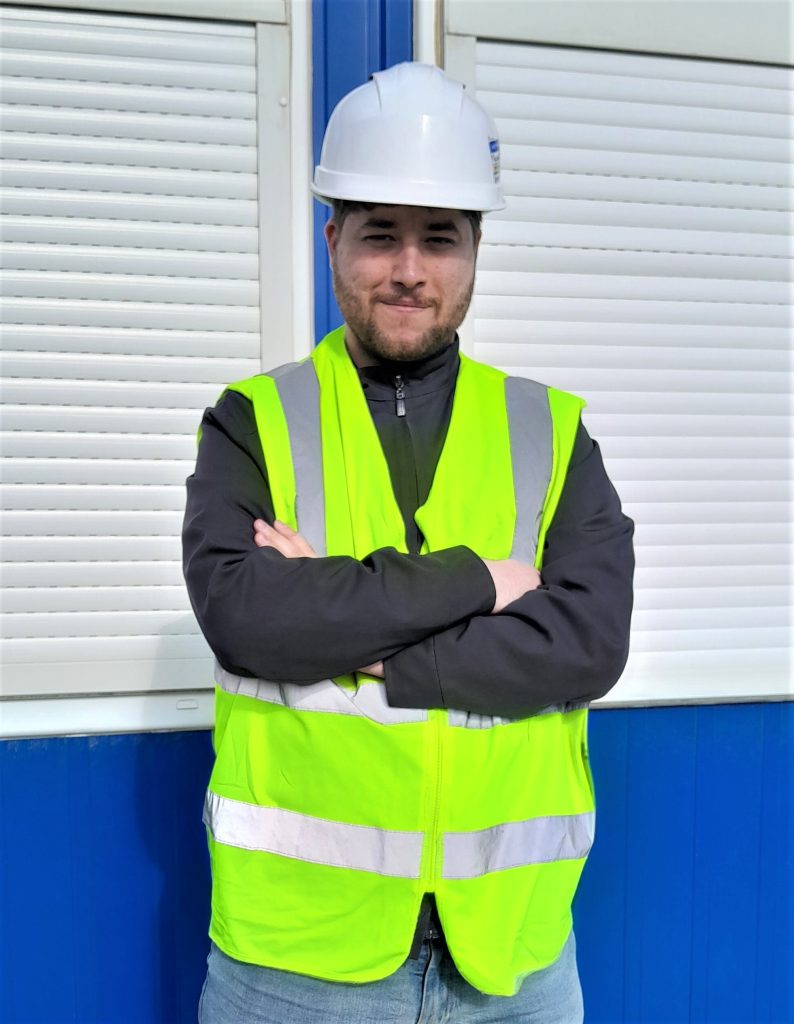INTERVIEW- PÉTER FÓNAGY
Few people can claim to have witnessed two high-tech start-ups in their careers, and perhaps even fewer have experienced it all within 4 years. Péter Fónagy, process engineer at SK On Hungary, first joined the opening team in Komárom and will be involved in the preparations for the start-up of the Ivánca plant in 2023.
In 2018, you applied to SK’s Komárom factory as an engineer. What attracted you to a company that was not yet present in Hungary?
There were two main reasons why I wanted to work at SK. One was the product itself: I find battery manufacturing very interesting, and I read a lot about it in my spare time.
As a chemical engineer, I am interested in both materials and technology. I wanted to work in a place where I could see battery manufacturing on a large scale, in mass production, because that’s what’s really interesting to me. At SK, I’m not sitting in a lab, I’m on the field. The other reason I applied was the opportunity to be part of an opening team. It has a lot of advantages and a lot of opportunities.
How have you seen the benefits?
An engineer has much more room for manoeuvre than if you’ve been working in an established factory for years. It feels good to have a say in how things are done, to be able to implement your ideas and make production more efficient. Of course, there are also strict principles that determine the direction, but it’s still much freer. Part of this is that being involved in the process from the beginning also gives me a broader knowledge and deeper understanding. The other advantage is that I am involved in processes that I would not have been able to participate in if I had not joined the opening team: monitoring the installation of the machines, purchasing the necessary equipment, selecting, and training colleagues, and so on.
Despite these benefits, you may have experienced some difficulties…
Yes, there are a few of those, because with a factory of this size, there are a lot of things that need to work, so we encounter problems every day. But whether this is an advantage, or a disadvantage is a matter of opinion.
I particularly like the fact that every day something new comes up that needs to be solved, because I see them as a challenge, not a difficulty. And then there are the inherent inconveniences of construction: dust, mud, machinery everywhere, huge areas to cover, lots of safety regulations that have to be strictly adhered to.
I’d be lying if I said that these circumstances don’t make everyday life difficult, but I know that it’s only temporary and for me the positives outweigh the negatives.
Comparing the Komárom and Iváncsa construction projects, how are they similar and how are they different?
In Komárom, we were struggling with the heat, and here it was winter when things accelerated. We had to adapt to the two most extreme weather conditions. That’s what immediately springs to mind from the construction site. As for the factory itself, Iváncsa is located on a much larger site, although the Komárom plant is not small. It is worth mentioning that the Komárom plant is modelled on the one in Seosan, whereas the situation in Iváncsa is completely different, and not only in terms of size. Although the main battery production processes are the same, there will be many innovations in equipment and technology in Iváncsa. This is a good reflection of how fast the industry is evolving, with only 3 years between the start of the two investments.
How do you see when is the launch date going to be on Iváncsa?
I think that the Iváncsa project is progressing at a good pace. Construction is really in its final stages, with most of the main buildings ready for use inside and out. As I am an engineer in the Electrode process, this is the area where I can comment the most. We are over 90% complete. The installation of the first row of machines is already complete, the technicians are working on the set-up, while the installation of the other rows is in full swing.
What does a process engineer’s working day look like?
Now, in the early days, it is very different from what it will be later. My main task at the moment is to prepare the start-up, a kind of project management. Even at this stage, there is the possibility to prevent any possible errors that might occur later on through precise, accurate preparations and later on through tests. Once production starts, I will work to ensure that the batteries produced are of high quality. Together with colleagues, we will analyse the faults, identify the causes and try to find solutions. The nature of battery production is that there is a relatively long time between processes and some types of defects can only be detected at a later stage of production. This is particularly true in my field. I have worked in Komárom, and will continue to work in Iváncsa, to minimise the chances of defective components leaving the Electrode and to detect defects at the outset.
What motivates you in your everyday life?
It is very important that if we have to spend most of our weekdays working, we find it enjoyable and interesting. For me, professionally, it is very much so. I also like well-functioning systems and challenges, which is one of the reasons why I came to Iváncsa. Seeing technology develop to this extent has always inspired me. Many people identify SK with outstanding salaries, which is true, but for me it’s not the amount of money that is the main driver. Of course, a good salary is essential for everyday well-being, but what makes me satisfied is that I find the motivation to go to work every day.


